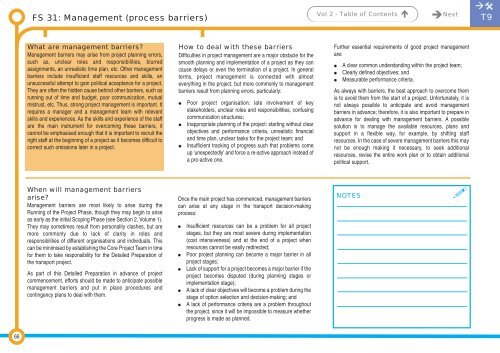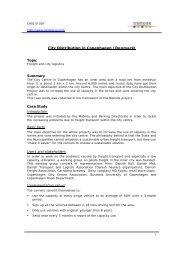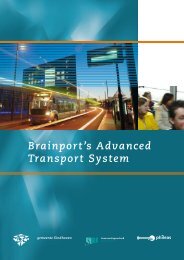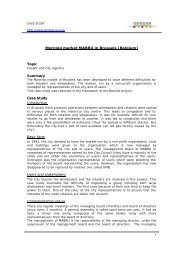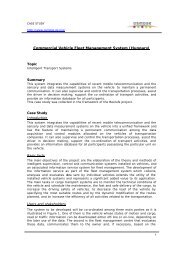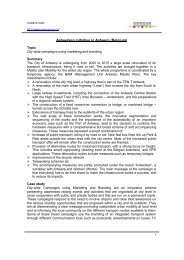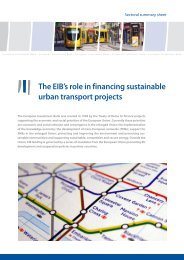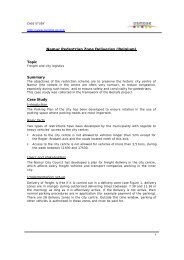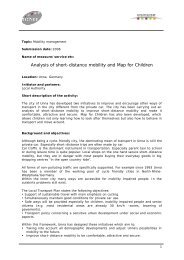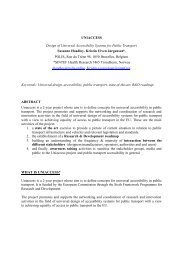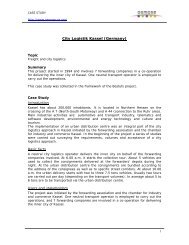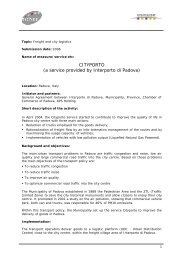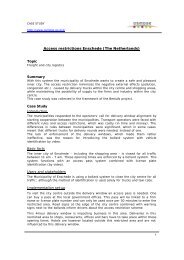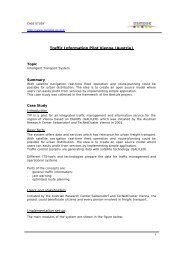Successful transport decision-making - Osmose
Successful transport decision-making - Osmose
Successful transport decision-making - Osmose
You also want an ePaper? Increase the reach of your titles
YUMPU automatically turns print PDFs into web optimized ePapers that Google loves.
FS 31: Management (process barriers)<br />
Vol 2 - Table of Contents <br />
Next<br />
<br />
T9<br />
What are management barriers?<br />
Management barriers may arise from project planning errors,<br />
such as, unclear roles and responsibilities, blurred<br />
assignments, an unrealistic time plan, etc. Other management<br />
barriers include insufficient staff resources and skills, an<br />
unsuccessful attempt to gain political acceptance for a project.<br />
They are often the hidden cause behind other barriers, such as<br />
running out of time and budget, poor communication, mutual<br />
mistrust, etc. Thus, strong project management is important. It<br />
requires a manager and a management team with relevant<br />
skills and experiences. As the skills and experience of the staff<br />
are the main instrument for overcoming these barriers, it<br />
cannot be emphasised enough that it is important to recruit the<br />
right staff at the beginning of a project as it becomes difficult to<br />
correct such omissions later in a project.<br />
How to deal with these barriers<br />
Difficulties in project management are a major obstacle for the<br />
smooth planning and implementation of a project as they can<br />
cause delays or even the termination of a project. In general<br />
terms, project management is connected with almost<br />
everything in the project, but more commonly to management<br />
barriers result from planning errors, particularly:<br />
<br />
<br />
<br />
Poor project organisation: late involvement of key<br />
stakeholders, unclear roles and responsibilities, confusing<br />
communication structures;<br />
Inappropriate planning of the project: starting without clear<br />
objectives and performance criteria, unrealistic financial<br />
and time plan, unclear tasks for the project team; and<br />
Insufficient tracking of progress such that problems come<br />
up 'unexpectedly' and force a re-active approach instead of<br />
a pro-active one.<br />
Further essential requirements of good project management<br />
are:<br />
<br />
<br />
<br />
A clear common understanding within the project team;<br />
Clearly defined objectives; and<br />
Measurable performance criteria.<br />
As always with barriers, the best approach to overcome them<br />
is to avoid them from the start of a project. Unfortunately, it is<br />
not always possible to anticipate and avoid management<br />
barriers in advance; therefore, it is also important to prepare in<br />
advance for dealing with management barriers. A possible<br />
solution is to manage the available resources, plans and<br />
support in a flexible way, for example, by shifting staff<br />
resources. In the case of severe management barriers this may<br />
not be enough <strong>making</strong> it necessary, to seek additional<br />
resources, revise the entire work plan or to obtain additional<br />
political support.<br />
When will management barriers<br />
arise?<br />
Management barriers are most likely to arise during the<br />
Running of the Project Phase, though they may begin to arise<br />
as early as the initial Scoping Phase (see Section 2, Volume 1).<br />
They may sometimes result from personality clashes, but are<br />
more commonly due to lack of clarity in roles and<br />
responsibilities of different organisations and individuals. This<br />
can be minimised by establishing the Core Project Team in time<br />
for them to take responsibility for the Detailed Preparation of<br />
the <strong>transport</strong> project.<br />
As part of this Detailed Preparation in advance of project<br />
commencement, efforts should be made to anticipate possible<br />
management barriers and put in place procedures and<br />
contingency plans to deal with them.<br />
Once the main project has commenced, management barriers<br />
can arise at any stage in the <strong>transport</strong> <strong>decision</strong>-<strong>making</strong><br />
process:<br />
<br />
<br />
<br />
<br />
<br />
Insufficient resources can be a problem for all project<br />
stages, but they are most severe during implementation<br />
(cost intensiveness) and at the end of a project when<br />
resources cannot be easily redirected;<br />
Poor project planning can become a major barrier in all<br />
project stages;<br />
Lack of support for a project becomes a major barrier if the<br />
project becomes disputed (during planning stages or<br />
implementation stage);<br />
A lack of clear objectives will become a problem during the<br />
stage of option selection and <strong>decision</strong>-<strong>making</strong>; and<br />
A lack of performance criteria are a problem throughout<br />
the project, since it will be impossible to measure whether<br />
progress is made as planned.<br />
NOTES<br />
<br />
66


